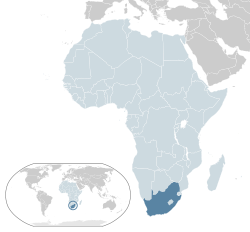Salatan nga Apriká
- Ini nga barasahon mahitungod han nasod ha Apriká. Para han rehiyon han Apriká, kadto-a an Kasalatan nga Apriká
An Republika han Salatan nga Aprika amo an usa ka nasod han Aprika. Tutulo an kapital o ulohan hini nga nasod ngan an mga kapital amo an mga syudad han Pretoria, Cape Town ngan Bloemfontein. An Pretoria amo an kapital han ehekutibo, an Cape Town an ulohan han magbabalaod o lehislatura ngan an Bloemfontein an kapital o ulohan han hukmanan o hudikatura.
Republic of South Africa
10 other official names:[1]
Republiek van Suid-Afrika (Afrikaans) iRiphabliki yeSewula Afrika (Southern Ndebele) iRiphabliki yomZantsi Afrika (Xhosa) iRiphabhuliki yaseNingizimu Afrika (Zulu) iRiphabhulikhi yeNingizimu Afrika (Swazi) Repabliki ya Afrika-Borwa (Northern Sotho) Rephaboliki ya Afrika Borwa (Sotho) Rephaboliki ya Aforika Borwa (Tswana) Riphabliki ra Afrika Dzonga (Tsonga) Riphabuḽiki ya Afurika Tshipembe (Venda) | |
|---|---|
 Kahamutang han Salatan nga Apriká (dark blue) – ha Africa (light blue & dark grey) | |
 | |
| Pamunuan |
|
| Gidako-i nga syudad | Johannesburg[2] |
| Opisyal nga mga pinulungan | |
| Ethniko nga mga grupo (2011[3]) |
|
| (Mga) Tawag hin tawo | South African |
| Kagamhanan | Unitary constitutional parliamentary republic |
| Jacob Zuma | |
| Cyril Ramaphosa | |
| Magbabalaod | Parliament |
| National Council of Provinces | |
| National Assembly | |
| Independence from the United Kingdom | |
• Union | 31 Mayo 1910 |
| 11 Disyembre 1931 | |
• Republic | 31 Mayo 1961 |
| Langyab | |
• Bug-os | 1,221,037 km2 (471,445 sq mi) (25th) |
• Katubigan (%) | negligible |
| Kamolupyohan | |
• 2014 estimate | 54,002,000[4] (25th) |
• 2011 nga census | 51,770,560[3]:18 |
• Densidad | 42.4/km2 (109.8/sq mi) (169th) |
| GDP (PPP) | 2014 nga banabana |
• Bug-os | $683.147 billion[5] (30th) |
• Per capita | $12,722[5] (87th) |
| GDP (nominal) | 2014 nga banabana |
• Bug-os | $341.216 billion[5] (34th) |
• Per capita | $6,354[5] (88th) |
| Gini (2009) |
63.1[6] very high |
| HDI (2013) |
▲ 0.658[7] namumutnga · 118th |
| Salapi | South African rand (ZAR) |
| Zona hin oras | UTC+2 (SAST) |
| Dapit hin pagmanehar | left |
| Kodigo hin pagtawag | +27 |
| ISO 3166 nga kodigo | ZA |
| Internet TLD | .za |
Pinanbasaran
igliwat- ↑ "The Constitution". Constitutional Court of South Africa. Ginkuhà 3 Septyembre 2009.
- ↑ "Principal Agglomerations of the World". Citypopulation.de. Ginkuhà 30 Oktubre 2011.
- ↑ 3.0 3.1 Census 2011 questionnaire[dead link]
- ↑ "Mid-year population estimates 2014" (PDF). Statistics South Africa. Ginkuhà 5 Agosto 2014.
- ↑ 5.0 5.1 5.2 5.3 "South Africa". International Monetary Fund. Ginkuhà 2014-10-16.
- ↑ "Gini Index". World Bank. Ginkuhà 2 Marso 2011.
- ↑ "2014 Human Development Report Summary" (PDF). United Nations Development Programme. 2014. pp. 21–25. Ginkuhà 27 Hulyo 2014.
Dugang nga barasahon
igliwat- A History of South Africa, Third Edition. Leonard Thompson. Yale University Press. 1 Marso 2001. 384 pages. ISBN 0-300-08776-4.
- Economic Analysis and Policy Formulation for Post-Apartheid South Africa: Mission Report, Aug. 1991. International Development Research Centre. IDRC Canada, 1991. vi, 46 p. Without ISBN
- Emerging Johannesburg: Perspectives on the Postapartheid City. Richard Tomlinson, et al. 1 Enero 2003. 336 pages. ISBN 0-415-93559-8.
- Making of Modern South Africa: Conquest, Segregation and Apartheid. Nigel Worden. 1 Hulyo 2000. 194 pages. ISBN 0-631-21661-8.
- South Africa: A Narrative History. Frank Welsh. Kodansha America. 1 Pebrero 1999. 606 pages. ISBN 1-56836-258-7.
- South Africa in Contemporary Times. Godfrey Mwakikagile. New Africa Press. February 2008. 260 pages. ISBN 978-0-9802587-3-8.
- The Atlas of Changing South Africa. A. J. Christopher. 1 Oktubre 2000. 216 pages. ISBN 0-415-21178-6.
- The Politics of the New South Africa. Heather Deegan. 28 Disyembre 2000. 256 pages. ISBN 0-582-38227-0.
- Twentieth-Century South Africa. William Beinart. Oxford University Press. 2001. 414 pages. ISBN 0-19-289318-1
Mga sumpay ha gawas
igliwat| Dugang nga pamiling mahitungod han South Africa ha kanan Wikipedia mga bugto nga proyekto: | |
| Mga kasirigngon tikang ha Wiktionary | |
| Sarigan nga basahon tikang ha Wikibooks | |
| Mga hulád tikang ha Wikiquote | |
| Gintikangan nga mga kasuratan tikang ha Wikisource | |
| Mga imahe ngan medya tikang ha Commons | |
| Mga sumat notisya tikang ha Wikinews | |
| Pagkukuhaan hin pagtuon tikang ha Wikiversity | |
- Government of South Africa
- Chief of State and Cabinet Members Ginhipos 2009-10-26 han Wayback Machine
- South Africa nga entrada ha The World Factbook
- South Africa profile from Africa.com
- South Africa Ginhipos 2008-10-26 han Wayback Machine from UCB Libraries GovPubs
- Salatan nga Apriká ngada ha Open Directory Project
- South Africa OECD
- South Africa from the BBC News
- South Africa at Encyclopædia Britannica
- SouthAfrica.info Ginhipos 2013-01-03 han Wayback Machine
- South Africa Tourism
- Wikimedia Atlas han South Africa
- Stunning South Africa ada ha Wayback Machine (archived Septyembre 18, 2010)[dead link] – slideshow by Life magazine
- Key Development Forecasts for South Africa from International Futures
Ipakita an sayop: <ref> tags exist for a group named "Note", but no corresponding <references group="Note"/> tag was found

